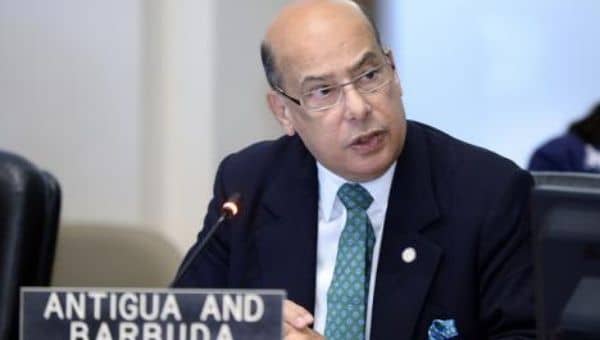
By Sir Ron Sanders
(The writer is Ambassador of Antigua and Barbuda to the United States and the Organisation of American States. He is also a Senior Fellow at the Institute of Commonwealth Studies at the University of London and at Massey College in the University of Toronto. The views expressed are entirely his own)
U.S. President Donald Trump’s new rule on immigration and nationality, published on Monday, August 12, is not different from the rules applied by Caribbean countries. It seeks to prohibit persons from migrating to the U.S. if they would become a charge upon the State, and it denies qualification for permanent residence status of such persons who are in the U.S. and who are reliant on Medicaid (government-provided health insurance), housing, food or other forms of public assistance.
Similarly, Caribbean Community (CARICOM) countries deny entry to foreigners, including nationals of other CARICOM countries if immigration officers have reason to believe that they could be a charge on the State’s resources.
The reason that President Trump offers for this new rule matches that proffered by CARICOM governments. First, he wants immigrants to the country to be able to bring value, and second, he does not want U.S. citizens to bear the cost of providing health, education and other aspects of social welfare to new arrivals. The new immigration rules will take effect from October 15.
Incidentally, while the implementation of the rule is new, it has actually been a provision of the U.S. Immigration and Nationality Act which, at Title 8- Aliens and Nationality, Chapter 12- Immigration and Nationality, Subchapter 11 – Immigration, says in general: “Any alien who, in the opinion of the consular officer at the time of application for a visa, or in the opinion of the Attorney General at the time of application for admission or adjustment of status, is likely at any time to become a public charge is inadmissible”. More specifically, it states: “In determining whether an alien is inadmissible under this paragraph, the consular officer or the Attorney General shall at a minimum consider the alien’s- (I) age; (II) health; (III) family status; (IV) assets, resources, and financial status; and (V) education and skills”.
Consequences will arise for Caribbean countries and others from President Trump’s decision to enforce this long dormant inadmissibility clause in the U.S. Immigration and Nationality Act. For a hundred years, people from the Caribbean and Central America have sought and received entry to the U.S., qualifying for permanent residence and citizenship. The migration of such persons has eased the pressure on Caribbean governments to provide direct employment and deliver goods and services to their citizens, as well as to create an environment for investment and economic growth and development.
Now, with the U.S. being cut-off for migration from October 15, except for the highly skilled and better-off, the strain on Caribbean governments will intensify, particularly as the opportunity for emigration to countries such as the United Kingdom and Canada have long since been restricted. For instance, the U.K. introduced its immigration law, depriving Commonwealth Caribbean citizens (except, recently, nationals of its remaining colonies) since 1962.
At times of economic decline and natural disasters in the Caribbean, people have moved to the U.S. mainland or its Caribbean territories, the U.S. Virgin Islands in order to work and keep themselves and their families. Some have done so legally; others not. Now, they will be judged by the same criteria – possibility of becoming a charge upon the state; assets; financial status; education and skills.
Also affected will be women who travel to the U.S. to deliver babies who, because of their birth on U.S. soil, would become U.S. citizens. In some cases, some of these women have utilized State resources for medical attention associated with the delivery of their babies. They, too, will be subject to the tests that the new rule now implements.
In this connection, the flow of migrants from the Caribbean to the U.S. will decrease to a trickle, exacerbating the difficult circumstances many Caribbean governments already confront in dealing with growing populations and insufficient economic space to provide employment and to deliver expected services.
President Trump’s decision, which he is entitled to make in the interest of his country as he sees it, has come at a time when most Caribbean countries are severely challenged; many of them have high debts, the repayment of which leaves them little space for spending on social welfare. They also lack enough capital to invest in job-producing projects, and the rules of the international financial institutions and donor governments deny them access to concessional financing.
Guyana is the present exception to this generally valid description of CARICOM countries. Its significant oil and gas resources, scheduled for production in early 2020, if managed properly, could transform its economic fortunes. Bloomberg reckons that, “this tiny nation on the north coast of South America is about to become the world’s newest petrostate—and potentially the richest”. Should substantial sums of the oil revenues flow into the Guyana government treasury, allowing spending on infrastructural and productive projects, not only will there be reverse migration by Guyanese, but opportunities could open for nationals of other CARICOM countries.
The Guyana possibility apart, President Trump’s new immigration rules should cause all Caribbean governments to consider how they cope with an increased population resulting from greatly restricted emigration. Many of the governments should review their immigration policies, adhering to a policy of employment for nationals first and limiting movement into their countries to needed skills and to financial resources that migrants bring. Even the present categories of workers that are allowed free movement within CARICOM should be reviewed considering current developments.
The proposal here is not a knee-jerk reaction. Rather, it is a response to a difficult situation that has been gathering steam for some time and which is fast coming to a head. CARICOM countries should collectively address the issue and determine how best they could jointly deal with it.
Advertise with the mоѕt vіѕіtеd nеwѕ ѕіtе іn Antigua!
We offer fully customizable and flexible digital marketing packages.
Contact us at [email protected]

















Well said Ron.
As much Donald Trump is not a like man in the Caribbean region this recent move by his administration is a fair one and it is certainly consistent with most Caribbean islands immigration policy.
Trinidad and Tobago has deported many persons because the have become a charge on the state, even U.S citizens are sent back to America along with many Caribbean Nationals most from Guyana and Jamaica.
While some may see the inflock of persons coming back home as a challenge, with great planning and preparation we can position ourself to deal with it. And more so whether or not we like it antiguans coming back home must be accepted.
One of our problem in this country is that to much antigua have plenty money in the bank sitting doing nothing and afraid to invest. If we are to look at this as a positive it must be viewed this way. With a bigger population it’s strengthen our economic base, more people in our country more spending activities more and more people passing through your business daily, but what we need now is for people to invest they money that is lying in the bank open business that can provide jobs for others.
The government program in building local entrepreneurship is a step in the right direction because more and business open in antigua today is certainly what is required.
So I say to the government we can do it. But we need to start to attract more foreign direct investment and more antigua need to get into business. We also need to open business in our communities not just the city. Agriculture and fisheries must expand build small fishing hubs in some of out communities for fish production etc. Our potentials are far from realize we nerd to be more creative and innovative.
Just as we US Americans have no say about what goes on in Caribbean countries, so we conversely have no expectation of Caribbean countries having a say about what goes on in the USA. We are each proud of our respective countries. Come visit our beautiful USA, and we will come visit your beautiful Caribbean country, but ultimately we are each citizens/taxpayers supporting our own unique governments, laws, culture and traditions.
Our President Trump lives by many ethical standards, and this simple “what is good for you is also good for me” is equitable. Many people resent our current tough stance because it is the hard choice, but the USA out of control spending by 50% of people who worked supporting 50% non-workers, plus too many other “entitlements” to mention given to non-taxpayers and interests that had no benefit to, and possibly hurt more than helped, the US Americans is the causation for the needed tough stance. Some like to blame Trump and everything and anything other than themselves, but their own dependence on the USA government is not good for anyone.
However, additionally, the USA government, our churches, corporations and private citizens do give other countries financial aid, grant and support generously. US Americans need never feel guilty, as we are forever sharing where and when needed. It is better to provide the short-term financial scaffolding for Caribbean countries to be long-term 100% independent of any dependence on any other country.
We believe in you; you’ve got this!
Comments are closed.